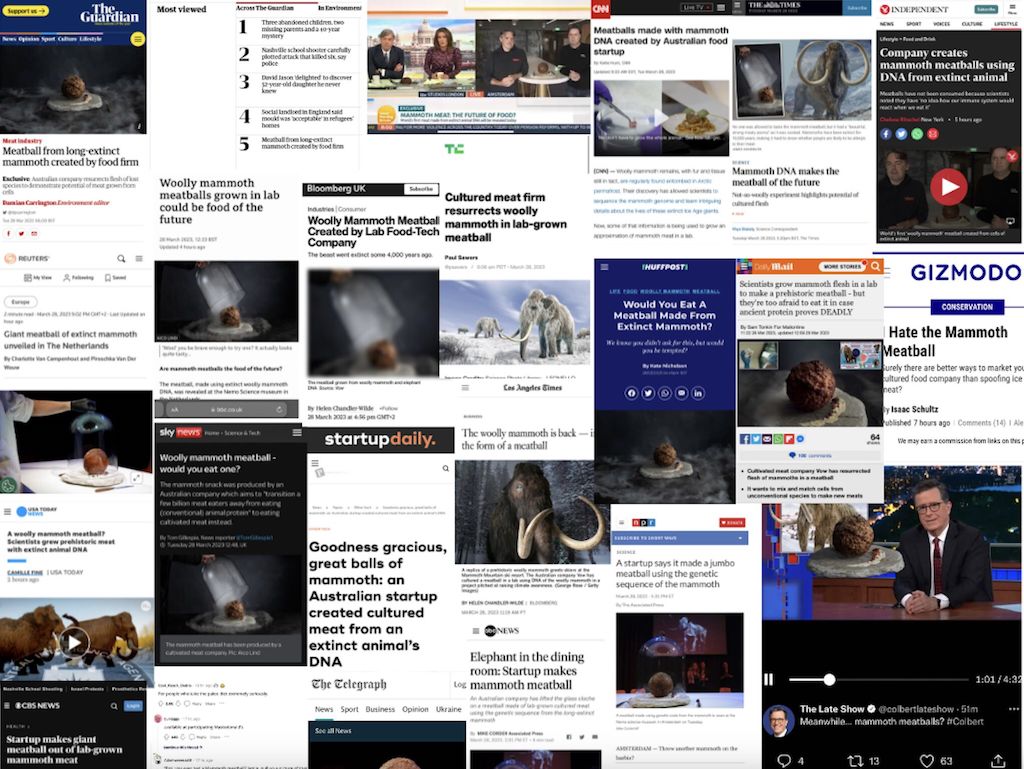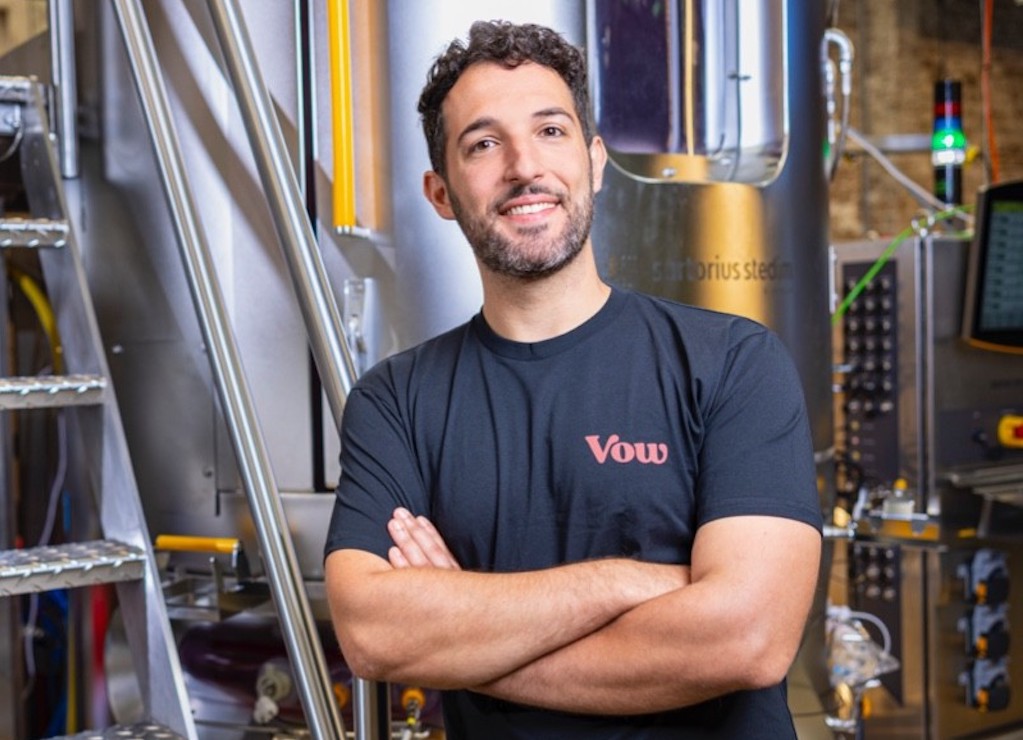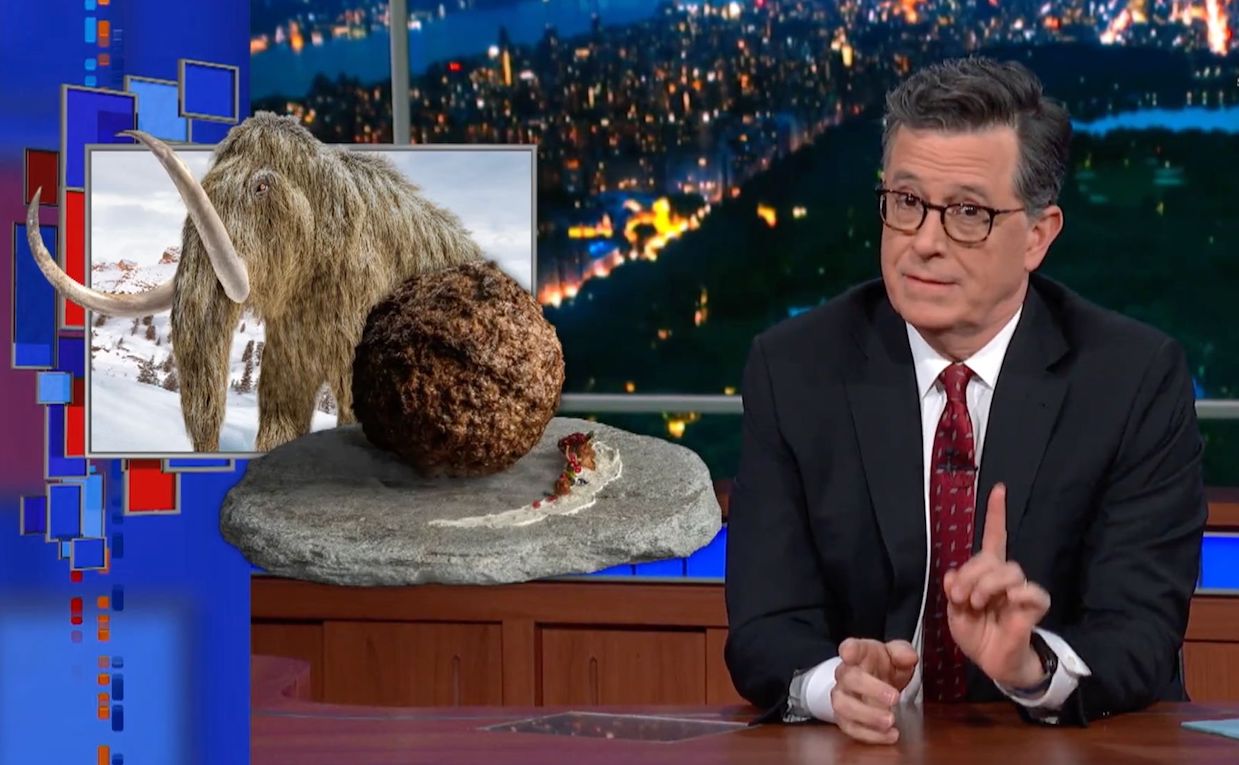Vow Founder On That Mammoth Meatball: “We Needed To Do Something So Outrageous That It Would Break Through Into Mainstream Media.
6 Mins Read
Green Queen‘s Sonalie Figueiras shares her reservations about Vow’s global headline-grabbing cultivated mammoth meatball event with company founder and CEO George Peppou in this exclusive interview.
“We created the mammoth meatball to serve as a starting point for this conversation.” So writes George Peppou, the founder and CEO of Australian cultivated meat company Vow, in a Medium post about the startup’s unveiling of a cultivated meatball made with DNA cells from the extinct wooly mammoth.
It’s safe to say that the company achieved this goal and more. In fact, chapeau to the entire Vow comms team, who did a phenomenal job and deserve a raise! (Or at least a bonus!). The mammoth meatball unveiling is likely the most talked-about cultivated meat event ever. As someone who covers the alt protein space closely, I can safely say I have never seen more earned media for such an industry announcement. Not only was the news broken by The Guardian, the story was also picked up by almost every major global news outlet: Bloomberg, TechCrunch, Business Insider, ABC, the Washington Post, the BBC to The Times all covered it. It made US television, with a bit on The Late Show with Stephen Colbert, which attracts an audience of over 2.3 million viewers. Even that altar of prestige journalism, The Atlantic, weighed in. We at Green Queen published the story too, nach.
While the vast majority of the coverage has been positive, a select few have questioned. Gizmodo‘s Isaac Schulz wrote about his take in a piece titled: I Hate The Mammoth Meatball. Truth be told, I share many of Schulz’s reservations.
Last year, a London-based startup called sent us a press release about their mission to produce cultivated lion and tiger meat and we chose not to cover the story. It seemed gratuitous, arrogant and entirely beside the point of the alternative protein industry’s raison d’être. The mission of this sector is to solve for food security and usher in an era of global food production that is safe, ethical, sustainable and nutritious. Why on earth would we want to do anything to glorify the consumption (and killing) of majestic, endangered creatures like lions and tigers? God forbid that this type of stunt would justify and embolden the already too numerous trophy hunters of today.
Still, Vow is a well-established, mission-driven cultivated meat player who last year raised the largest Series A in the sector ever. Peppou, who is seen by many as a true and fearless visionary when it comes to the future of food, has spoken many times about the company’s goal to “invent entirely new meats” and has hinted at a future of cultivated zebra and kangaroo meat. I wanted to get more context from him about how the team decided to go ahead with the meatball and he kindly obliged – our interview below.

Sonalie Figueiras: You have said you did this to bring cultivated meat into mainstream conversation. Is this the right conversation? It could be argued that promoting extinct species consumption does not address climate change or food security, or health, ie the main motivators to disrupt food with cultivated meat?
George Peppou: Two key points here: (1) We needed to do something so outrageous that it would break through into mainstream media. The original cultured meat hamburger was produced 10 years ago, and yet the mainstream media still rarely covers any large advancement in cultured meat. The mammoth meatball project has been covered extensively, and has a whole new cohort of people talking about whether or not they would eat cultured meat. (2) While the mammoth meatball is a product concept (and not something we currently plan to bring to market), it is still produced using cultured meat technology, so all of the sustainability benefits that apply to cultured chicken, still apply to cultured mammoth.
Sonalie Figueiras: Do you worry that this could risk weaponizing the narrative of cultivated meat in the vein of the dangers of ‘bringing Jurassic Park to life’ narrative?
George Peppou: No. We are not bringing whole animals to life. That is definitely a criticism aimed at others but isn’t relevant here. For every one person who says “ew” there seems to be another two saying “yes, please!”.
Sonalie Figueiras: On the conservation front, Gizmodo journalist Isaac Schultz writes: “When you think of the woolly mammoth, do you think “the future of food?” I don’t. What’s next—polar bear patties? Sea turtle stew? I don’t think a product designed to be salivated over and consumed is the best way to bring attention to climate change and conservation issues, even if the meat is lab-cultivated.” How would you reply to that?
George Peppou: I think the very fact that Isaac has written an article about cultured meat, the future of food and sustainability indicates that this project has had its desired effect. We are having conversations today that we simply weren’t having yesterday. Cultured meat is (hopefully) only a few months away from being sold in the US, and yet still, very few consumers are familiar with what it is.

Sonalie Figueiras: Do you worry it may put off regulators, particularly in geographies where they are already skeptical of the technology, and that they may see this as a distraction / gimmicky?
George Peppou: No, every regulator and country we have worked with has been incredible. The reactions from regulators have been the same as the public, entertained by the spectacle and aware that mammoth is a stunt, not a product. There is real support from within the regulatory bodies we have spoken to, to ensure that cultured meat can be brought to market in a safe manner. If it is not safe, it is not food.
Sonalie Figueiras: Do you wonder about the political ramifications of such a tasting, with the pro-meat lobby weaponizing the news to further push their anti-innovation, anti-food-tech agenda by saying that if funds were to be allocated to the space, they would be used for non-essential purposes rather than to sustainably feed the world?
George Peppou: To be clear, there was no tasting of the mammoth meatball. This was a concept used to start a discussion and bring cultured meat into the mainstream discussion. Throughout the press around the meatball project we have been very clear about our belief that traditional agriculture and cultured meat will need to co-exist. Cultured meat is not going to replace traditional agriculture in the near future, but it does provide an important source of high-quality protein in a sustainable manner.
Sonalie Figueiras: Lastly, and this was my biggest concern personally with the other startup that says it’s working on cultivated lion and tiger, do you worry that this kind of event will serve to glorify the consumption of endangered animals?
George Peppou: This is a valid question and something that we have spent a lot of time thinking and talking about internally. In the case of this particular project, we don’t believe that this is a concern (as the mammoth is already extinct).




